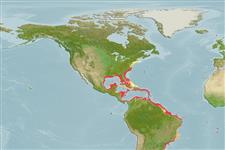Teleostei (teleosts) >
Perciformes/Scorpaenoidei (Scorpionfishes) >
Scorpaenidae (Scorpionfishes or rockfishes) > Scorpaeninae
Etymology: Scorpaena: Latin, scorpaena = a kind of fish, 1706 (Ref. 45335).
Eponymy: Charles Plumier (1646–1704) was a Franciscan monk, botanist and naturalist. [...] (Ref. 128868), visit book page.
More on author: Bloch.
Environment: milieu / climate zone / depth range / distribution range
Ecology
Marine; reef-associated; depth range 1 - 70 m (Ref. 126840), usually 5 - 55 m (Ref. 5288). Subtropical; 43°N - 30°S, 98°W - 5°W
Western Atlantic: Bermuda, Massachusetts, and northern Gulf of Mexico to southern Brazil. Eastern Atlantic: Ascension and St. Helena.
Size / Weight / Age
Maturity: Lm ? range ? - ? cm
Max length : 45.0 cm TL male/unsexed; (Ref. 5288); common length : 30.0 cm TL male/unsexed; (Ref. 3812); max. published weight: 1.6 kg (Ref. 40637)
Dorsal spines (total): 12; Dorsal soft rays (total): 10; Anal spines: 3; Anal soft rays: 5. Occipital pit present; three to four spines on part of preorbital overlapping maxillary; large white spots on dark background on inner basal part of pectoral fin (unclear in specimens smaller than 3 cm SL) (Ref. 13608).
Found mostly in shallow coral reef and rocky areas. Lies motionless on the bottom (Ref. 9710). Feeds mostly on other fishes and crustaceans. Moderately common below about 5 m depth to at least 55 m. Displays characteristic bright white spots on dark background of pectoral axil when disturbed (Ref. 49392). Anterolateral glandular groove with venom gland (Ref. 57406). Eaten locally and said to taste a bit like chicken. Traded as an aquarium fish at Ceará, Brazil (Ref. 49392).
Life cycle and mating behavior
Maturity | Reproduction | Spawning | Eggs | Fecundity | Larvae
Smith-Vaniz, W.F., B.B. Collette and B.E. Luckhurst, 1999. Fishes of Bermuda: history, zoogeography, annotated checklist, and identification keys. American Society of Ichthyologists and Herpetologists Special Publication No. 4. 424 p. (Ref. 35505)
IUCN Red List Status (Ref. 130435: Version 2024-1)
Human uses
Fisheries: minor commercial; aquarium: commercial
Tools
Special reports
Download XML
Internet sources
Estimates based on models
Preferred temperature (Ref.
123201): 21.9 - 28, mean 25.6 °C (based on 770 cells).
Phylogenetic diversity index (Ref.
82804): PD
50 = 0.5000 [Uniqueness, from 0.5 = low to 2.0 = high].
Bayesian length-weight: a=0.01514 (0.00977 - 0.02344), b=2.99 (2.86 - 3.12), in cm total length, based on LWR estimates for this species & Genus-body shape (Ref.
93245).
Trophic level (Ref.
69278): 3.6 ±0.3 se; based on diet studies.
Resilience (Ref.
120179): Low, minimum population doubling time 4.5 - 14 years (Preliminary K or Fecundity.).
Fishing Vulnerability (Ref.
59153): Low to moderate vulnerability (35 of 100).
Nutrients (Ref.
124155): Calcium = 26.5 [10.7, 67.5] mg/100g; Iron = 0.53 [0.27, 1.47] mg/100g; Protein = 19.3 [17.6, 21.0] %; Omega3 = 0.293 [0.127, 0.806] g/100g; Selenium = 16.8 [7.9, 40.6] μg/100g; VitaminA = 58.3 [19.9, 179.9] μg/100g; Zinc = 0.815 [0.541, 1.238] mg/100g (wet weight);
